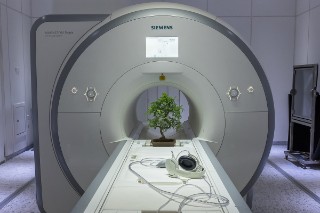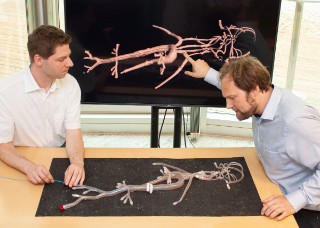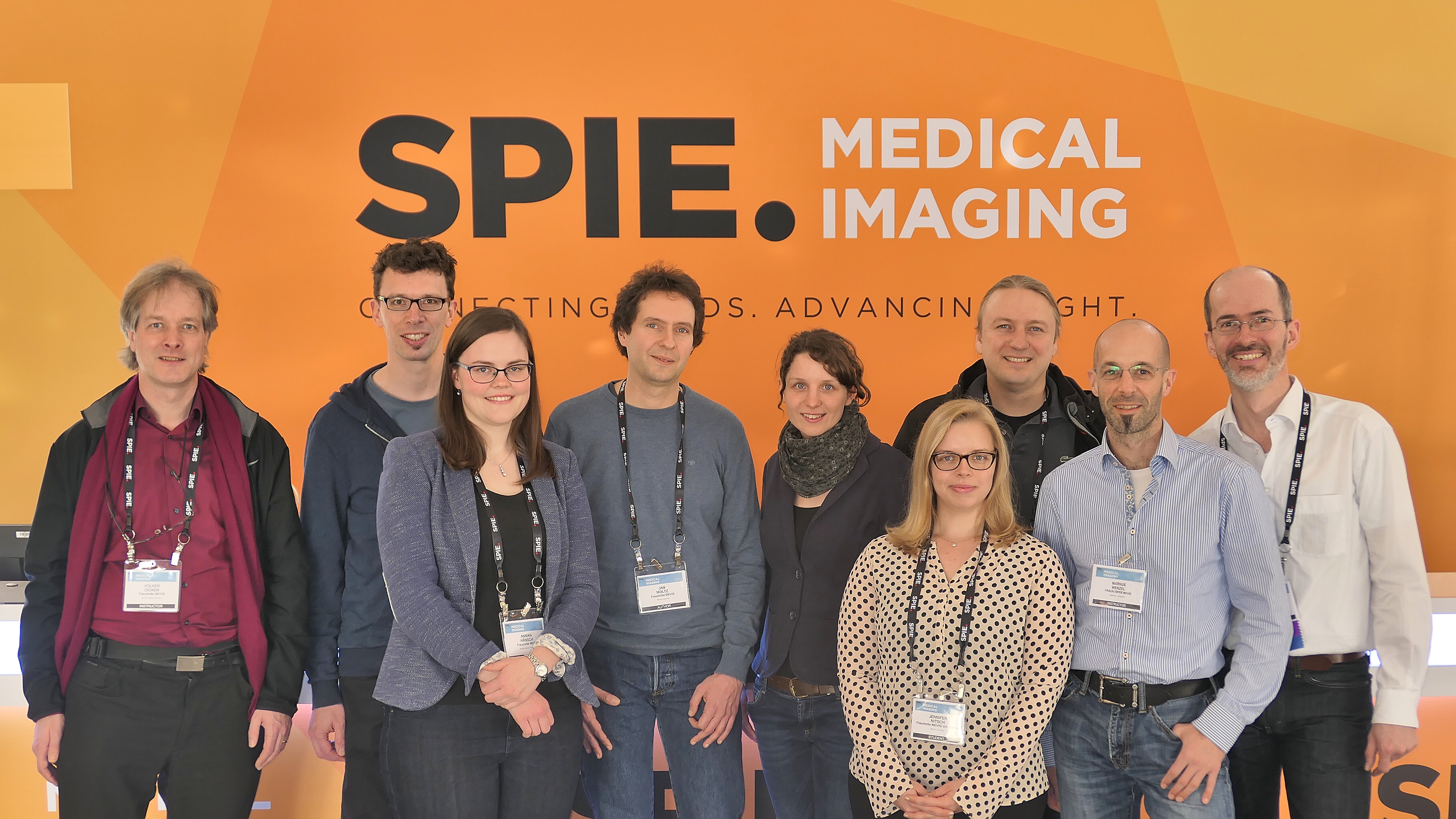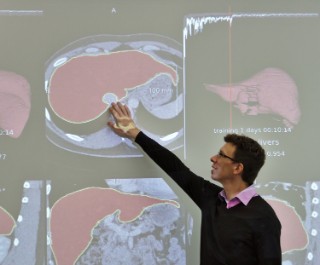
During the “STEAM Imaging II” artist residency at Fraunhofer MEVIS, two artists from Singapore develop an interactive installation and participate in a youth workshop.
more info
During the “STEAM Imaging II” artist residency at Fraunhofer MEVIS, two artists from Singapore develop an interactive installation and participate in a youth workshop.
more info
Endovascular interventions are an integral part of the medical routine with 6 million procedures done worldwide annually. During the procedure, doctors insert a thin, flexible wire to navigate the catheter into the blood vessels to apply stents or remove blood clots. In order to navigate the catheter precisely through the vessels, patients undergo X-rays during the procedure. One downside is that “patients and doctors are exposed to a considerable amount of radiation,” says Dr. Torben Pätz, mathematician at the Fraunhofer Institute for Digital Medicine MEVIS in Bremen. “In addition, the Xrays merely show a 2D projection instead of a 3D image, which can sometimes impede precise localization of the catheter.” Fraunhofer MEVIS is developing a system called IntelliCath (Intelligent Catheter Navigation) to remedy these problems.
more info
Artificial intelligence and adaptive algorithms – in medicine, these are gaining increasing importance. Speaker programs at international conventions also reflect this trend by focusing more and more on possible applications of this new technology. One example is the Medical Imaging conference hosted by the International Society for Optics and Photonics (SPIE), which will take place in San Diego, California, from February 16 to 21. At this renowned convention, the Fraunhofer Institute for Digital Medicine MEVIS will be represented by a number of experts who will provide insight into deep learning.
more info
The Fraunhofer Institute for Medical Image Computing MEVIS is one of the most prestigious research facilities of its kind. At four locations in Bremen, Lübeck, Berlin, and Aachen, the institute develops innovative software systems that support doctors in their daily routine, from heart diagnostics and tumor therapy to big data analysis for large-scale studies. Now, the institute’s main facility in Bremen will move into a new home. The cornerstone for the building will be laid at 11 o’clock on December 5, 2018. Starting in autumn 2020, it will provide a communicative and creative working environment for the MEVIS team.
more info
The Fraunhofer MEVIS Institute for Medical Image Computing – in short: Fraunhofer MEVIS – is one of the world’s leading research centers in digital medicine. In order to prepare computer science students for challenges in this area, the institute and the University of Bremen are now cooperating even more closely in teaching. This winter semester saw the introduction of a new study area called Medical Computing in the Faculty of Mathematics / Computer Science.
more info
One of the world’s most important conferences in the field of computer assisted radiology and surgery, CARS 2018, will take place from June 20 to 23 in Berlin. The Fraunhofer Institute for Medical Image Computing MEVIS in Bremen will make an essential contribution to one of the conference’s key topics: How can minimally invasive heart procedures be performed more effectively and patient-friendly with the help of modern data and image processing algorithms?
more info
On June 5, the Fraunhofer-Gesellschaft will present Taiwanese artist Yen Tzu Chang in the scope of the “Science and Art in Dialog” event series in Berlin. She created a performance entitled “Whose Scalpel” during her artist residency at the Fraunhofer Institute for Medical Image Computing MEVIS. In a subsequent open discussion, Institute Director Horst K. Hahn and Ars Electronica Artistic Director Gerfried Stocker will explore complexity as a term and its possible ramifications for our society.
more info
Four complex, interwoven vascular systems pass through the liver. Surgically removing tumors is therefore often a great challenge. The Fraunhofer Institute for Medical Image Computing MEVIS has developed algorithms that analyze patients‘ imaging data and calculate surgical risks. This makes liver cancer surgery safer and easier to plan.
more info
What effect does a particular cancer medicine or radiation therapy have on patients? To find out, physicians use CT images to determine whether a tumor’s size changes during the course of treatment. In the PANTHER project, a joint team of experts aims at gaining further valuable information from these images. In the future, doctors will be able to find out at an early stage whether a cancer treatment is effective or should be changed. The Fraunhofer Institute for Medical Image Computing MEVIS, with its branches in Bremen and Lübeck, is an essential project partner. This spring, the project team will present the interim results from the first project period.
more info
Bit by bit, computer assistants with the ability to learn are finding their way into hospitals and doctors’ practices. They support doctors during diagnosis and therapy planning. Until now, computer scientists played the primary role in designing and developing such ‘deep-learning’ algorithms. The Fraunhofer Institute for Medical Image Computing MEVIS in Bremen, however, is now developing AI systems in close cooperation with physicians. In Chicago on November 26, Fraunhofer MEVIS researchers will present their first promising results at RSNA 2017, the most important radiology congress in the world.
more info